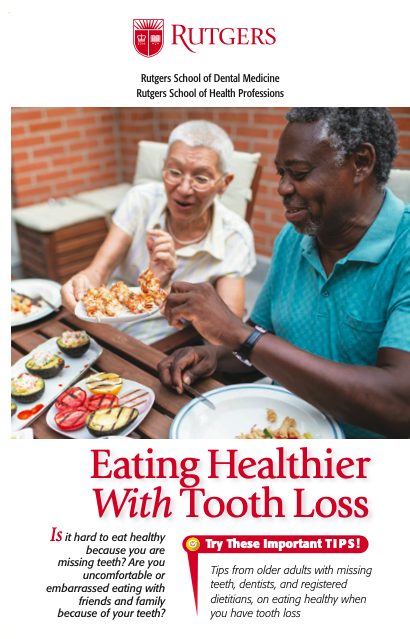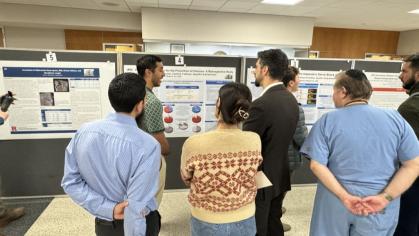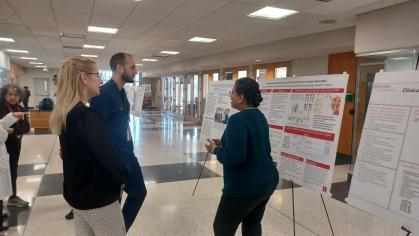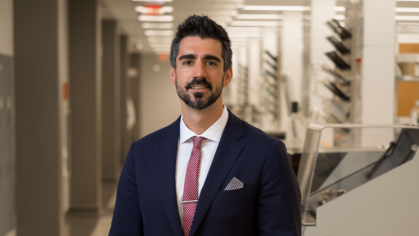RSDM Researchers Develop Nutrition Education Tool to Help Older Adults with Tooth Loss
 Dentists everywhere can now access a tool to help patients with tooth loss learn how to incorporate nutritious foods in their diet, and why that’s so important. Researchers at Rutgers School of Dental Medicine and Rutgers School of Health Professionals collaborated to create the “Eating Healthier with Tooth Loss” brochure, which is also available online as a PDF. “Older adults are prone to tooth loss, and that can make it hard to eat foods that contain nutrients they need to remain healthy,” said Rena Zelig, lead investigator on the research. Zelig is director of the Master of Science in Clinical Nutrition program and an associate professor at RSHP, as well as an adjunct assistant professor at RSDM. Researchers interviewed older patients lacking functional dentition — meaning they have 20 or fewer teeth — to learn how tooth loss affected their eating experience. Patients reported that they avoided many fruits, vegetables, grains and meats, opting for softer and far less nutrient-dense foods such as mashed potatoes and ice cream, Zelig said. However, they also shared adaptive techniques they used to improve their intake. The brochure’s development involved input from focus groups of patients and members of the RSDM faculty. About 25 pairs of RSDM dentists and patients later tested a preliminary brochure, and provided feedback that was incorporated into the final version, she said. The result is a diet education tool that takes “a user-centered approach, integrating patient voices and experiences and scientific evidence,” Zelig said. The brochure includes quotes from patients about the challenges they face and adaptations they’ve made that work, such as using scissors or small electric chopper to create bite-size pieces of vegetables. The brochure also addresses the social challenges surrounding tooth loss, and provides tips for becoming more comfortable eating around others. Zelig said the feedback has been positive. One RSDM student commented, “this is a great tool for older adults because it provides so many examples of how to incorporate healthy foods in the diet.” Another said it was “very informative and easy to understand.” About 500 copies of the six-panel brochure were printed and displayed in RSDM’s clinics. To extend the project’s reach, a three-page PDF version was created, and is available here. It is free, but users must register to download it. The material is licensed by Rutgers University. Zelig recently presented the research virtually at the conference of the American Association for Dental, Oral, and Craniofacial Research. The next stage of Zelig’s research will be developing a method for measuring the tool’s effectiveness. The project was funded by a $15,000 grant from the Academy of Nutrition and Dietetics Foundation, through the Colgate Palmolive Fellowship in Nutrition and Oral Health. ###
Dentists everywhere can now access a tool to help patients with tooth loss learn how to incorporate nutritious foods in their diet, and why that’s so important. Researchers at Rutgers School of Dental Medicine and Rutgers School of Health Professionals collaborated to create the “Eating Healthier with Tooth Loss” brochure, which is also available online as a PDF. “Older adults are prone to tooth loss, and that can make it hard to eat foods that contain nutrients they need to remain healthy,” said Rena Zelig, lead investigator on the research. Zelig is director of the Master of Science in Clinical Nutrition program and an associate professor at RSHP, as well as an adjunct assistant professor at RSDM. Researchers interviewed older patients lacking functional dentition — meaning they have 20 or fewer teeth — to learn how tooth loss affected their eating experience. Patients reported that they avoided many fruits, vegetables, grains and meats, opting for softer and far less nutrient-dense foods such as mashed potatoes and ice cream, Zelig said. However, they also shared adaptive techniques they used to improve their intake. The brochure’s development involved input from focus groups of patients and members of the RSDM faculty. About 25 pairs of RSDM dentists and patients later tested a preliminary brochure, and provided feedback that was incorporated into the final version, she said. The result is a diet education tool that takes “a user-centered approach, integrating patient voices and experiences and scientific evidence,” Zelig said. The brochure includes quotes from patients about the challenges they face and adaptations they’ve made that work, such as using scissors or small electric chopper to create bite-size pieces of vegetables. The brochure also addresses the social challenges surrounding tooth loss, and provides tips for becoming more comfortable eating around others. Zelig said the feedback has been positive. One RSDM student commented, “this is a great tool for older adults because it provides so many examples of how to incorporate healthy foods in the diet.” Another said it was “very informative and easy to understand.” About 500 copies of the six-panel brochure were printed and displayed in RSDM’s clinics. To extend the project’s reach, a three-page PDF version was created, and is available here. It is free, but users must register to download it. The material is licensed by Rutgers University. Zelig recently presented the research virtually at the conference of the American Association for Dental, Oral, and Craniofacial Research. The next stage of Zelig’s research will be developing a method for measuring the tool’s effectiveness. The project was funded by a $15,000 grant from the Academy of Nutrition and Dietetics Foundation, through the Colgate Palmolive Fellowship in Nutrition and Oral Health. ###



